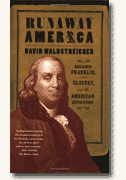David Waldstreicher
book reviews:
· general fiction
· chick lit/romance
· sci-fi/fantasy
· graphic novels
· nonfiction
· audio books
· author interviews
· children's books @
curledupkids.com
· DVD reviews @
curledupdvd.com
newsletter
win books
buy online
links
home
for authors
& publishers
for reviewers

 |
Runaway America: Benjamin Franklin, Slavery, and the American Revolution David Waldstreicher Hill and Wang Paperback 336 pages July 2005 |
|
In recent years, there has been a resurgence of interest in the “founding fathers” of the United States and a parade of books reexamining their lives and times have hit the bestseller lists. David McCullough’s John Adams shed new light on the president formerly dismissed by history as the “guy in between Washington and Jefferson.” Ellis’s Founding Brothers exposed how the personal relationships between Jefferson, Hamilton, Burr, Madison and the other men of the founding generation helped shape the Republic they were trying to form. The list could go on and on, but the point is that each of these books reopened the lives of these men and added a new dimension to our understanding. But Benjamin Franklin? What more is there to be said about him? Everybody knows about Benjamin Franklin; the lightening experiments, the Poor Richard’s Almanac, the coonskin cap while in Paris, his role as leading advisor and statesman to the revolutionaries. What more is to be said? Waldstreicher’s book, Runaway America, rightly does not try to reexamine the entire life and political leanings of Franklin. Instead, it focuses on a subject that is often glossed over by biographers and by Franklin himself: slavery, the American Revolution, and Franklin’s true beliefs on the role of the slave in America.
Waldstreicher traces Franklin’s life from his days as a runaway apprentice to his early life in London to his eventual success and power as a printer. In doing so, he continually highlights the contradictions inherent in Franklin’s life. How could a former runaway apprentice, that fled a cruel master to seek liberty and his own fortune, condone slavery? And yet, Runaway America suggests that at times in his life, Franklin owned slaves. At the very least, his printing empire helped foster their sale and capture when they ran away. How could somebody who chafed at being “unfree” as an apprentice buy into the system that he found so abusive? Yet Franklin had many apprentices and scolded them for their complaints about the very things that he ran away from as a young man. Runaway America’s strength lies in the fact that it does not try to interpret or “spin” any of Franklin’s actions that seem at odds with each other. Instead, Waldstreicher presents them as many sides of a man who both employed and fought against the society he was struggling to conquer. Another strong point of the book is that it uses Franklin’s own writings about slavery and puts them in the proper historical context. Hence, the reader can see how Franklin’s narratives through the years deal with the issue of the “unfree” in America. He writes about this over and over, using the voice of a sugar plantation slave woman, a native Briton, a rural New Englander -- each grappling with the same question: what does it mean to be free? What is personal freedom and what is political freedom? Again, Waldstreicher rightly highlights how Franklin dealt with slavery issues in terms of America’s struggles for equity with England. Overall, this is a good book that will leave the reader with a new understanding of both Franklin and how the thorny issue of slavery helped shape early America. Some may find it a little too dry for casual, light reading, though. At times, the cast of history’s “lesser knowns” that made up much of Franklin’s early business world can be confusing and bland. However, the meat of Waldstreicher’s message is well worth it. Runaway America should take its place alongside Ellis, Ambrose, and McCullough on the bestseller list. © 2004 by Jennifer McCready for curledup.com. |
| Also by David Waldstreicher: |
|
|
|
 Click here to learn more about this month's sponsor! |
|
| fiction · sf/f · comic books · nonfiction · audio newsletter · free book contest · buy books online review index · links · · authors & publishers reviewers |
|
| site by ELBO Computing Resources, Inc. | |
 Like many Americans, my image of Franklin and his beliefs about slavery was mostly formed by the activities in the last decade of his life. After all, he was the President of an abolitionist society and he petitioned the revolutionaries to end slavery when they were framing the Constitution. It is pretty easy to conclude that his beliefs were “anti-slavery,” which is in keeping with the avuncular and wise image that history has given to Franklin. The truth, as Runaway America elegantly demonstrates, is much more complicated than Franklin simply being “for or against” slavery.
Like many Americans, my image of Franklin and his beliefs about slavery was mostly formed by the activities in the last decade of his life. After all, he was the President of an abolitionist society and he petitioned the revolutionaries to end slavery when they were framing the Constitution. It is pretty easy to conclude that his beliefs were “anti-slavery,” which is in keeping with the avuncular and wise image that history has given to Franklin. The truth, as Runaway America elegantly demonstrates, is much more complicated than Franklin simply being “for or against” slavery.